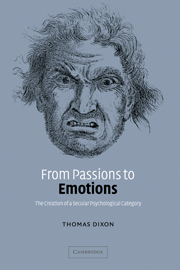Book contents
- Frontmatter
- Contents
- Acknowledgments
- Note on quotations
- 1 Introduction: from passions and affections to emotions
- 2 Passions and affections in Augustine and Aquinas
- 3 From movements to mechanisms: passions, sentiments and affections in the Age of Reason
- 4 The Scottish creation of ‘the emotions’: David Hume, Thomas Brown, Thomas Chalmers
- 5 The physicalist appropriation of Brownian emotions: Alexander Bain, Herbert Spencer, Charles Darwin
- 6 Christian and theistic responses to the new physicalist emotions paradigm
- 7 What was an emotion in 1884? William James and his critics
- 8 Conclusions: how history can help us think about ‘the emotions’
- Bibliography
- Index
8 - Conclusions: how history can help us think about ‘the emotions’
Published online by Cambridge University Press: 22 September 2009
- Frontmatter
- Contents
- Acknowledgments
- Note on quotations
- 1 Introduction: from passions and affections to emotions
- 2 Passions and affections in Augustine and Aquinas
- 3 From movements to mechanisms: passions, sentiments and affections in the Age of Reason
- 4 The Scottish creation of ‘the emotions’: David Hume, Thomas Brown, Thomas Chalmers
- 5 The physicalist appropriation of Brownian emotions: Alexander Bain, Herbert Spencer, Charles Darwin
- 6 Christian and theistic responses to the new physicalist emotions paradigm
- 7 What was an emotion in 1884? William James and his critics
- 8 Conclusions: how history can help us think about ‘the emotions’
- Bibliography
- Index
Summary
Historically this term [emotion] has proven utterly refractory to definitional efforts; probably no other term in psychology shares its nondefinability with its frequency of use.
A. S. Reber, The Penguin Dictionary of Psychology, 234Recapitulation: an enriched history of emotion theories
Of all the theories of emotions produced in the nineteenth century, William James' theory was the only one that became famous and influential within academic psychology. James' theory is still the starting point for much contemporary theory and research into emotions. Philosophers and psychologists of emotions of the last two decades, such as William Lyons, Rom Harré, Patricia Greenspan, Keith Oatley, Robert Solomon, Jon Elster and Peter Goldie, all relate their ideas to James' theory of emotions. Many contemporary theorists also refer to Darwin's work on expression, but they generally refer to no nineteenth-century emotions theorists other than these two. In the last three decades, those who have for various reasons appealed to the theories of passions and emotions of the past, have tended to refer to an increasingly stale canon of past theorists including Aristotle, Descartes, Hume, Spinoza, Darwin, James and Wundt.
The neglect by philosophers, psychologists and historians of psychology and philosophy of other philosophical and, especially, religiously oriented writers on the passions, affections and emotions during the eighteenth and nineteenth centuries and, especially, during the professionalising William James era, seems to be a classic example of the phenomenon of ‘victors’ history'.
- Type
- Chapter
- Information
- From Passions to EmotionsThe Creation of a Secular Psychological Category, pp. 231 - 251Publisher: Cambridge University PressPrint publication year: 2003



